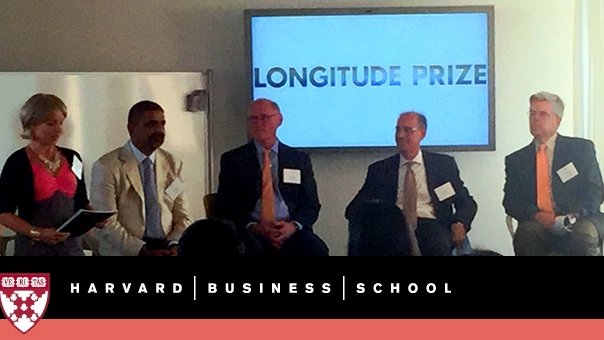Longitude Prize goes to Harvard Business School
18 Sep 2015
Written by Tamar Ghosh
On Tuesday the 8th of September we were delighted to hold our first major Longitude Prize event in the United States, in Boston at Harvard Business School. The event was hosted by HM Consul General in Boston Susie Kitchens, who opened the event. Susie welcomed the 75 guests from across the Boston area, explaining the UK government’s full commitment to addressing antimicrobial resistance and involvement in many projects and activities, including acting as funding partner to the Prize through Innovate UK.
HM Consul General Kitchens said: “I hope this launch of the Longitude Prize at Harvard will spur UK – US collaboration to address the complex and significant challenges posed by AMR.”
Since the Longitude Prize opened to the world in November 2014 we have had 106 teams enter, 24 of which are from all corners of the US, and we hope this event will help boost these numbers. In May of this year we saw 8 of the 24 registered US teams submit their entries to win, although none were from the Boston area. However, we know there is great work being done locally around antimicrobial resistance.
This issue is also high in the US agenda, and we heard from Dr James M Anderson, Deputy Director at the National Institutes of Health (NIH), about current efforts, including the scoping of an AMR diagnostics challenge to be announced early next year. We’ve been pleased to be able to help provide input towards the development of this new Prize, and feel it will be a good complement to the Longitude Prize and the Horizon 2020 Prize in this same field.
“Congratulations on the successful launch of the Longitude Prize competition. We look forward to a similar level of enthusiasm from the community for the AMR diagnostics challenge to be announced by the US Department of Health and Human Services in early 2016,” said Dr Anderson.
The event was supported by UK Trade & Investment and the Consulate, which helped to ensure we had a broad range of attendees in the room, including the best minds working in this area. Attendees represented the main universities in the Boston area and also included large, medium and small size pharmaceuticals, medtech and biotech companies.
In line with a key ambition of the Prize we also worked with our partners, Harvard Business School and the T.H. Chan Harvard School of Public Health(link is external), to ensure we had a range of attendees who aren’t currently working in this space but could collaborate to enter. Professor Karim Lakhani of Harvard Business School, Principal Investigator of the Crowd Innovation Lab and NASA Tournament Lab, and part of the Steering Group of the Centre for Challenge Prizes at Nesta, talked about the advantages of a Prize approach to issues like this, including research that shows that people outside of the field in question are often the winners of challenge prizes.

“Innovation contests are an effective way to harness the creativity of scientists in diverse disciplines. The attendees at the Longitude Prize introduction in the USA represented the best of the Boston area scientific community interested in AMR,” said Professor Lakhani.
The Longitude Prize and its rich history and context were laid out by Professor Rifat Atun, Professor of Public Health Systems at T.H. Chan Harvard School of Public Health and member of the Longitude Committee. He mentioned the objectives of the Prize in engaging the public as much as possible to inspire and engage new minds on this global problem.
Professor Atun said: “The Longitude Prize will bring together the best global science to generate a global solution for a global challenge.”
The Prize, which aims to conserve antibiotics for future generations, is looking for a transformative point-of-care test that tells us when antibiotics are needed and, if they are, which ones. Professor Kevin Outterson, Professor of Health Law at Boston University and a member of the Longitude Prize Advisory Panel, explained exactly what teams need to do to win the Prize. He talked through the criteria which include the test being affordable, accurate, rapid, and easy-to-use in any location, anywhere across the world. The criteria are meant to be challenging, and the test must meet these and inform decision making around antibiotics.
“The Prize focuses our brightest minds on a difficult problem – how to use antibiotics effectively after a rapid point-of-care diagnosis,” said Professor Outterson.
The audience posed various questions about the criteria, how entries will be assessed, and the process for teams from now until the Prize is won or 5 years go by. We had a good conversation about what we can do to help bring individuals and teams together to form new collaborations, which is a keen objective of the Prize.
We also recognised that although this is a huge global issue that needs a number of approaches at the same time, a diagnostic of the kind we are looking for would make a huge contribution to safeguarding existing and new antibiotics and bringing more timely evidence to tough decisions made by patients and clinicians regarding antibiotic use. The attendees asked to exchange contact details with each other and we hope to see some teams coming together in time for the next submission deadlines: 30 September 2015 and end of January 2016.
From left to right in photo: HM Consul General in Boston Susie Kitchens, Professor Karim Lakhani of Harvard Business School, Dr James Anderson of the National Institutes of Health, Professor Rifat Atun of Harvard School of Public Health and Longitude Committee, Professor Kevin Outterson of Boston University and Longitude Prize Advisory Panel
